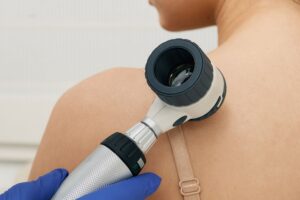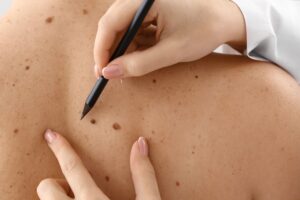Skin Cancer Checks Brisbane
Protect Your Skin With Regular Skin Cancer Checks
Australia has one of the highest rates of skin cancer in the world. In fact, 2 in 3 Australians will be diagnosed with skin cancer by the age of 70.
Skin cancer checks are crucial for people living in the Sunshine State, as increased sun exposure can create a higher risk of skin cancer. At Carina Medical Centre you can find independent medical specialists in skin cancer care who can provide a range of skin cancer services for all your family, including skin cancer detection checks, risk assessments, testing and treatments. The three most common skin cancers a GP skin specialist will examine you for are:
- Squamous cell carcinoma
- Basal cell carcinoma
- Melanoma
By scheduling regular appointments at a skin cancer clinic in Brisbane, you will be reducing the risk of severe skin cancer diagnoses through early prevention.
Doctors who offer skin checks at Carina Medical:
Looking for a GP skin specialist? Why not visit one of the doctors practicing at Carina Medical Centre?
 |
 |
 |
 |
|
Dr Leili Imani |
Dr Mia Didovic |
Dr Dariush Ghahramanipour |
Dr Greg Wuth |
Skin cancer services:

Biopsy
If you have a suspicious or unusual mole or growth, the doctors can perform a biopsy to help ascertain a correct diagnosis of the growth, mark or lump on your skin.
The biopsy procedure is performed in the Brisbane doctors clinic and generally requires no preparation on your part.

Early detection
Skin cancer is the cancer you can see, and catching it early can make all the difference. Regular skin exams — both at home and with your doctor — are essential for early detection and effective treatment.
This is especially important in Brisbane and across Queensland, where the sunny climate increases exposure to harmful UV rays.

Skin cancer checks
A skin cancer check is an assessment of your skin cancer risk including any current or future skin concerns.
A skin cancer check appointment will include taking your medical history, including previous sun UV exposure, as well as undertaking a detailed examination of your skin. You can receive a melanoma skin check at a cancer skin clinic or via a GP skin specialist, where your skin will be examined from head to toe to check for any suspicious spots, moles or growths.
Skin check doctors
The doctors who work from The Carina Medical & Specialist Centre provide high quality and personalised skin cancer services including skin cancer checks, early detection, prevention and management of skin cancers. They are located in Carina and service the South Brisbane suburbs and surrounding greater Brisbane area.
Your skin cancer doctor will assess your skin for suspicious lesions with the use of a dermascope which enables the doctor to check your suspicious moles at a microscopic level. At this level, your doctor can see the images with high-resolution details that may not be obvious with a naked eye, and the pictures can be photographed and saved for future monitoring and comparison.
Are you at risk of skin cancer?
Anyone can get skin cancer, and while people with certain characteristics and skin conditions, are at greater risk than others, anyone living in Queensland should check skin regularly.
The primary risk factor for skin cancer is exposure to ultraviolet (UV) light, including sunlight and tanning beds, with the risk increasing in line with the amount of exposure.
People who live in areas with bright, year-round sunlight or those who spend a lot of time outdoors exposed to the sunlight, have a high risk of developing skin cancers. Early exposure, particularly for people who had frequent sunburns as a child, also increases the risk of skin cancer.
Reducing factors under your control may help lower your risk of skin cancer, including melanoma. Regular skin examinations can help to identify a developing skin cancer early, when it is most treatable.
Certain characteristics that can lead to a higher risk of skin cancer include:
- Light or fair skin colour
- Skin that burns, freckles, reddens easily, or becomes painful in the sun
- Skin with certain types and a large number of moles
- A personal or family history of skin cancer
- A compromised immune system or are on immunosuppression medication
- Spent lots of time outdoors unprotected or work outdoors
- Suntanned, use or have used solariums and/or sunlamps
Mole removal Brisbane doctors
If a mole is considered to be suspicious or in potential for developing skin cancer, your doctor may recommend having it removed with simple in-house surgical procedures. You will need to watch the area, as sometimes a mole can grow back.
How to check your own skin for skin cancer
In between skin checks by your doctor, you can also detect skin cancer early by following dermatologists’ tips for checking your skin.
If you notice a spot or mole that is different from others, or that changes colour, grows in size, itches or bleeds, you should make an appointment to see your doctor immediately.
Tips to perform a skin self-exam:
- Examine your body in a full-length mirror, starting with the front and back in the mirror, then look at the right and left sides with your arms raised.
- Look at your underarms, forearms, and palms. Bend your elbows and look carefully at your forearms, underarms, and palms.
- Look at your legs, between your toes, and the soles of your feet. These are places that you wouldn’t suspect skin cancer to develop, however, it often does.
- Use a hand mirror to check hard to see places such as your back, buttocks and the back of your neck and scalp.

Skin Check FAQs
How often should I get my skin checked?
It’s recommended that you have your skin checked annually, however, your skin type and family history of skin cancer also plays a role in frequency. Your doctor will advise you on how often you should have your skin checked based on your personal risk factors.
What happens during a skin check?
Your skin cancer doctor will examine your entire body, checking for any unusual moles, spots, or growths. In some instances, your doctor will take a biopsy for further testing if they find a spot they deem suspicious.
Are there any warning signs of skin cancer?
Yes, there are! The most common warning signs include:
- Moles that change in size, colour or shape
- Redness, itching or tenderness in a specific area
- New moles or spots on your skin
Having regular skin check appointments, as well as performing self-checks, can you help you identify skin cancer in its early stages.
How do I prepare for a skin check?
There is minimal preparation involved to get moles checked. We simply advise you wear minimal makeup, avoid any nail polish, and remove all jewellery so that your skin cancer doctor has a clear view of your skin.
Should I perform a skin check at home?
Yes, we encourage you to carry out your own skin checks — keeping an eye on your skin and its spots and moles is a great way to stay proactive about skin cancer. However, it’s important to remember that a self-examination is not a substitute for a skin check with your doctor.
Who is at most risk of skin cancer?
People with fair skin, a significant amount of existing moles, and a family history of skin cancer are generally at a higher risk.
Book a skin cancer check today


